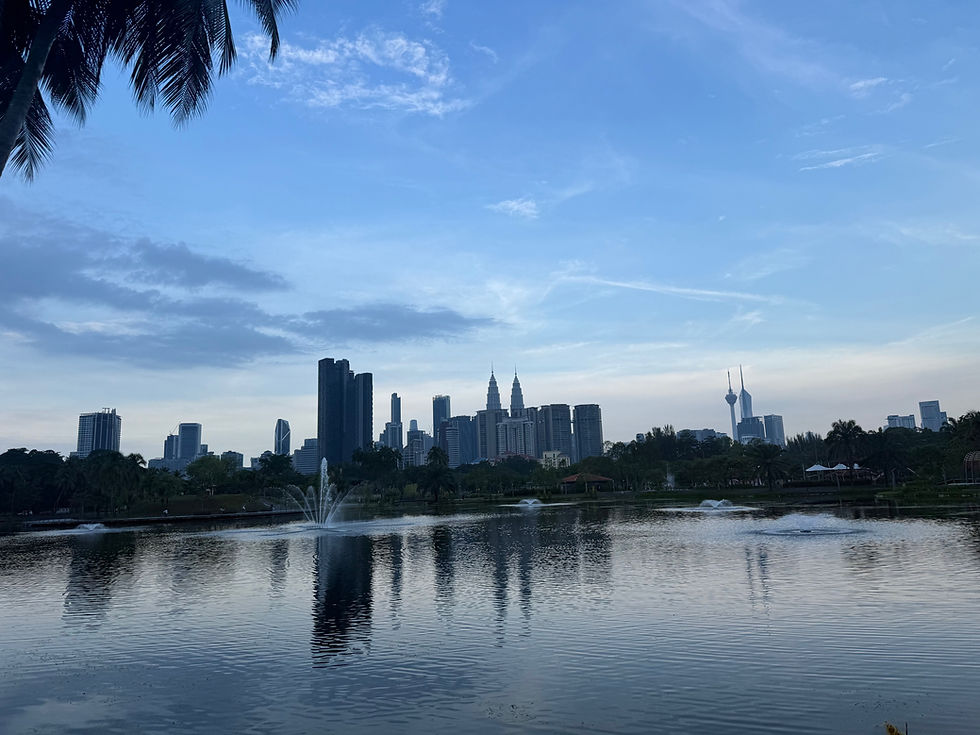Don’t Be Fooled By France: Extremists Still Won
- Nikola Ranick
- Jul 22, 2024
- 6 min read
Updated: Jul 29, 2024

NOTE: As of publishing, I acknowledge the impressive developments that Macron and his allies have accomplished in parliamentary votes. This short-term success, however, does not discount the conclusions discussed below. If anything, they are another false narrative meant to allay concerns about the growing French Fringe.
----------------------------------------------------------------------------------------
Much of the European Establishment (certainly the EU) was relieved by disappointing final results for the Far Right in France’s recent snap elections. Yet under this seemingly good news are details that may lead international affairs punditry into another trap of irrational expectation setting: 1) Firstly, there is an undeniable victory for the far right in both growing support and building additional momentum into the upcoming presidential election and/or surprise snap elections within the year and 2) Frustratingly further buried, this is a victory for radicals of the Far Left, long belying undertones of racism, antisemitism, and anarchic global persuasions.
In short, rather than demonstrate a thankful detour from the extremist rabbit hole, these results could lay the groundwork for conditions that might supercharge radicalism. That would put France in a particularly precarious position, given its fragile demographic-cultural tightrope which has long shown signs of fraying. These developments will be multi-faceted and likely poorly reported due to the inherent discomfort of the subject matter; a news media bias in favor of globalist attitudes; and, unfortunately, the nature of modern European leftism (at least the type still getting votes).
My concerns:
#1: The Rising Far Right: Le-Pen Me In For President
Once more do we witness preliminary expectation-setting as damning for the desired party and triumphant for its opposition. The National Rally's showing is by far its strongest, with its second-round vote share increasing to 17.3%, an overall increase of 8.5%. As has been the case in the recent decade, this is a new high for the re-branded National Front, proof it is benefiting from both political sanitation of its more fringe elements (at least public facing), as well as an increasing radicalism in French Society. Remember, despite the country's notoriety as a libertine haven, the founding nation of (the now denigrated) Le Wokisme, maintains a penchant for runaway populism. This proclivity is further amplified, if not instigated, by a large immigrant base that is mostly unassimilated.

This contradiction lies in two components, the first being the influence of its cosmopolitan capital. Encompassing 20% of the French population and nearly 30% of its GDP, Parisians are often seen (and resented) as alien to the rest of the country. Reactionary politics are common in countries with a city of massive influence alongside a large electorate outside of it, yet I find the best parallel would be (startlingly) Hungary. Anyone who has been to Budapest will note its grandeur, cosmopolitan nature, and striking diversity for Eastern Europe. The other two-thirds of Hungary tends to scapegoat the capital, instigated by the ruling, illiberal Fidesz. Indeed, for many capital-centric nations, its smaller cities and rural denizens are fertile soil for populism. But it goes without saying that Hungary's demographics and culture are significantly less diverse than France.

Tragically, the demographic difference of the French is the second factor by which the far right's rise is explained: Anti-assimilation and cultural resentment by nationals and immigrants alike. Middle Eastern and North African Immigrants often fail to adapt to French society, due to a combination of poor integration efforts, suburban slum-slamming, and a general inelasticity of European culture. At the same time, the local French —yes even Le Woke Parisians — are themselves unwilling to engage the 'other', as any traveler to this stubborn country will know. This reinforcing cycle is consistently a dreadful race to the bottom, with immigrant slums becoming a haven for both crime, radicalization, and just plain disorder (see reoccurring riots that would make even the most impassioned American anarchist blush). It goes without saying that these many Muslim migrants (the largest cohort in Europe) deserve much better, but simply are not getting it. And they make for perfect cannon fodder for the populist right to exploit in its bid for power.

In summary: The National Rally’s sanitation alongside France’s radicalization has created the perfect populist playground as they meet in the middle. This also continues Europe’s alarming pattern of surging youth support for the far right, embodied by the National Rally’s 28-year-old party leader Jordan Bardella, as well as the even further right party Reconquete, lead by Marion Marechal (Marine Le Pen's disenchanted niece).
Yet my worry for the far-right extremism lies not just in underlying preconditions but these very results, in their middling effect. By now, there is near universal agreement that President Macron's sloppy election gamble was meant to mirror the likes of Spain’s. That country’s Prime Minister, Pedro Sanchez, called a snap election after local results saw strong growth for the right. Ever the political mastermind, Sanchez called the country’s bluff in daring the electorate to put these rightists in national leadership. Discouraged by weeks of scandals coming from this new far right, they did not. Such right-wing wash-outs have been common in Spain, a young democracy with clear (though fading) memories of its fascist rule.
In a similar manner, these French elections were called after EU elections saw strong results for the French right. But Macron's gamble that it would push the electorate away from the right turned out to be a poor one. With early polling in France showing dissimilarity to the Spanish Model, more maniacal players (or maybe just their spin doctors) suggested Macron could be looking to hold his enemies closer by allowing their rise to government, and banking on gridlock, radical missteps, and overall government disorder to deflate their support. The end result from such a disorderly parliament could lead to another snap election (still a possibility) or, at least, significantly weaken Marine Le Pen’s front runner status in upcoming presidential elections. I find that strategy quite cynical, as well as unfortunate, considering, if this theory holds true, the current hung parliament is actually the worst outcome for Macron.

Likely relegated to opposition, the Nationally Rally will benefit from both the narrative of its rise as well as poor approval from whatever divided majority coalition (or minority) emerges. If anything, the lack of stable coalition partners will likely only play into the right's narrative of failure by traditional elites. It may set up a perfect storm for both presidential and parliamentary control by the National Rally in the very near future. As always, the party out of power will look enticing the longer an inefficient governing regime meanders on.
#2: The Left’s Hydra Heads: Melenchally
Bernie, take a seat: this is not Democratic Socialism; it's even worse. The surprise divine resurrection of the French Left saw a political comeback via many political parties and figures (most notably, the previously reviled former president Francois Hollande). To be fair, it was a refreshing shakeup for an electorate used to unabashed centrism vs. unrestrained radicalism. But I remain skeptical that this development will actually shake up that dichotomy in even the short run.
The loudest leader (and technical organizer of the left block) was far-left radical and presidential aspirant Jean Luc Melenchon. Often dubbed the Jeremy Corbyn of France, he has a record of both internal and external radical politics. He is highly skeptical of the EU, prone to anti-Semitic and xenophobic rants before it was cool, demands the renegotiation of many inter-European treaties, is a media basher and a Maduro (and occasional Putin) apologist. He is also adamant for a constitutional rewrite to the point of suggesting a presidential coup from his party’s recent victory stage.

Before the hecklers butt in, yes I do know that this leftist coalition is a diverse menagerie of radicals from the likes of Melenchon to mild left-of-center Social Democrats, many of whom have already disavowed his coup comments. But if the political spectrum is a circle, many instincts of Melenchon and Le Pen intersect. After all, do not forget the National Rally campaigns on economically liberal issues that are similarly championed by the far left. Indeed, with Melenchon’s penchant for social conservatism, it seems like the biggest difference between these ideologies are its lead thinkers.
Growing support of Melenchnites aside, this very presence in parliament (and perhaps government if a coalition forms) will again provide leverage to governmental disorder that may be off-putting for the average French voter. It is a reinforcement to the National Rally’s vision as a stable party alongside potentially poisoning the well of moderate leftist parties that Melenchon may continue to formally, or at least ideologically, align with.
In short, one step forward is just setting up for two steps back. The winner of this election is whoever can best argue the divided results mean change in their direction. For now that seems to benefit the National Rally over the left. But even if it does benefit the Revived Left, such gains will come accrue to its further left elements as opposed to a more meandering Center-Left. After all, Europe's traditional social democratic parties are in a long death-march that even a governing party in Germany cannot prevent. Le Pen is optimistic and probably should be. Anything could happen, but it appears this mild stumble in the right's long-running growth may be a surprise opportunity for a quicker photo-finish to absolute government control.





Comments